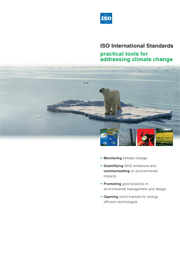
- Climate change
ISO standards include tools for advancing the specific goals of this year's World Environment Day (WED – 5 June), the theme of which is combatting climate change. Overall, ISO's offering includes hundreds of environment-related standards that support the broader aims of World Environment Day, which is coordinated by the United Nations Environmental Programme (UNEP), a partner in the development of many of these standards.
ISO Secretary-General Rob Steele comments: "ISO has over 500 International Standards directly related to environmental subjects and many more that can help in reducing environmental impacts. Offering business, government and society a complete portfolio of practical tools for tackling environmental challenges, they range from standards for sampling, testing and analytical methods, through environmental management and environmental aspects of product design, to new work on ship recycling."
ISO standards directly related to climate change include ISO 14067, now under development, for measuring the carbon footprint of products. It will complement the already published standards ISO 14064 and ISO 14065, which provide an internationally agreed framework for measuring greenhouse gas (GHG) emissions, verifying claims made about them, and accrediting the bodies which carry out such activities.
ISO standards offer practical tools for addressing climate change at four levels:
1. Monitoring climate change
ISO technical committee ISO/TC 211 develops standards on geographic information and geomatics. ISO is also collaborating with the Food and Agriculture Organization of the United Nations (FAO) and the World Meteorological Organization (WMO) to further elaborate standards measuring essential climate variables that help to characterize the effects of climate change.
2. Quantifying GHG emissions and communicating on environmental impacts
ISO 14064 is emerging as the global benchmark on which to base programmes for reducing GHG emissions and emissions trading programmes.
ISO has developed a number of standards to ensure good practice in environmental claims and communications. They include ISO 14020 (environmental labels and declarations); ISO 14063 (environmental communication), and ISO 21930 (environmental declaration of building products).
3. Promoting good practice in environmental management and design
The ISO 14000 family of standards for environmental management developed by ISO technical committee ISO/TC 207 is firmly established as the global benchmark for good practice in this area.
ISO 14001, which provides the requirements for environmental management systems (EMS), contributes to any organization's objectives to operate in an environmentally sustainable manner. Up to the end of December 2007, more than 154 000 ISO 14001 certificates of conformity had been issued to private and public sector organizations in 148 countries and economies.
The ISO 14000 family includes supporting tools for environmental management and designing environmentally friendly products and services. They include ISO 14004 (EMS guidelines); ISO 14040 (life cycle analysis), and ISO Guide 64 (environmental issues in product standards).
4. Opening world markets for GHG emission reduction and trading, and energy efficient technologies
International Standards can also make essential contributions to realizing the full potential of energy efficiency measures based on existing technology and good practice, as well as to disseminating innovative technologies – particularly for renewable and carbon-neutral energy sources.
In the case of innovative technologies, standards can reduce the time to market of products and services based on them, create global interest and develop a critical mass of support to ensure the economic success of such technologies.
ISO has already developed standards with an impact on climate change for areas such as building environment design, energy efficiency of buildings and sustainability in building construction, intelligent transport systems, solar energy, wind turbines, nuclear energy and hydrogen technologies.
ISO's proactive stance on energy and climate change matters has resulted in the initiation of ISO work on energy management systems (the future ISO 50001) and the examination of new opportunities in energy efficiency and renewable energy sources.
- ISO and its partners, the International Electrotechnical Commission (IEC) and the International Telecommunication Union (ITU) are highlighting their climate change contributions in this year's World Standards Day on 14 October, of which the theme is "Tackling climate change through standards".
- In March 2009, ISO jointly organized a workshop in Paris with the International Energy Agency (IEA) and IEC on "International Standards to promote energy efficiency and reduce carbon emissions".